 OTHER BOOKS BY MARTN ESPADA Poetry Imagine the Angels of Bread City of Coughing and Dead Radiators Rebellion Is the Circle of a Lovers Hands Trumpets from the Islands of Their Eviction The Immigrant Iceboys Bolero Translation The Blood That Keeps Singing:
OTHER BOOKS BY MARTN ESPADA Poetry Imagine the Angels of Bread City of Coughing and Dead Radiators Rebellion Is the Circle of a Lovers Hands Trumpets from the Islands of Their Eviction The Immigrant Iceboys Bolero Translation The Blood That Keeps Singing:
Selected Poems of Clemente Soto Vlez
(with Camilo Prez-Bustillo) Editor El Coro: A Chorus of Latino and Latina Poetry Poetry Like Bread: Poets of the Political
Imagination from Curbstone Press Essays Zapatas Disciple 
 Adjusting type size may change line breaks. Landscape mode may help to preserve line breaks. Copyright 2000 by Martn Espada All rights reserved
Adjusting type size may change line breaks. Landscape mode may help to preserve line breaks. Copyright 2000 by Martn Espada All rights reserved
First Edition For information about permission to reproduce selections from this book,
write to Permissions, W. W. Norton & Company, Inc.,
500 Fifth Avenue, New York, NY 10110 Composition by JoAnn Shambier
Book design by Jam Design The Library of Congress has cataloged the printed edition as follows: Espada, Martn, 1957
A Mayan astronomer in Hells Kitchen : poems / Martn Espada.
p. cm.
ISBN 0-393-04888-8
1.
Hispanic AmericansPoetry. I. Title. PS3555.S53 M39 2000
811.54dc2199-052626 ISBN 978-0-393-32168-5 pbk. ISBN 978-0-393-25377-1 (e-book) W. W.
Norton & Company, Inc., 500 Fifth Avenue, New York, N.Y. 10110
www.wwnorton.com
W. W. Norton & Company Ltd., Castle House, 75/76 Wells Street, London W1T 3QT This book is dedicated to Abe Osheroff CONTENTS I
A TARANTULA IN THE BANANAS II
A MAYAN ASTRONOMER IN HELLS KITCHEN III
A LIBRARY OF LIONS ACKNOWLEDGMENTS Some of these poems have appeared or will appear in the following publications, to whose editors grateful acknowledgment is made: Americas Review: Preciosa Like a Last Cup of Coffee, The Shiny Aluminum of God, Pegao, Ode to Your Earrings El Andar: The Rage of Plantation Days Black Warrior Review: Pitching the Potatoes, What Francisco Luis Espada Learned at Age Five, Standing on the Dock, For the Jim Crow Mexican Restaurant in Cambridge, Massachusetts Where My Cousin Esteban Was Forbidden to Wait Tables Because He Wears Dreadlocks Boston Globe: Another Nameless Prostitute Says the Man Is Innocent Crazy Horse: I Apologize for Giving You Poison Ivy by Smacking You in the Eye with the Crayfish at the End of My Fishing Line, Anarchism and the Parking Meter, A Cigarettes Iris in the Eye of a Candle A Gathering of the Tribes: My Name Is Espada, The Mexican Cabdrivers Poem for His Wife, Who Has Left Him, Ornithology at the Caribe Hilton, Crucifixion in the Plaza de Armas Harpers: For the Jim Crow Mexican Restaurant in Cambridge, Massachusetts Where My Cousin Esteban Was Forbidden to Wait Tables Because He Wears Dreadlocks Illuminations: Prisoner AM-8335 and His Library of Lions Index on Censorship: Another Nameless Prostitute Says the Man Is Innocent, Prisoner AM-8335 and His Library of Lions Long Shot: The Eleventh Reason Luna: The Ghost in the Trunk of the Car, The Janitors Garden Mid-American Review: Genuflection in Right Field Peacework: Another Nameless Prostitute Says the Man Is Innocent Ploughshares: Thanksgiving Poetry Flash: Another Nameless Prostitute Says the Man Is Innocent Poetry Review: The Eleventh Reason Power Lines (Ta Chucha Press): A Cigarettes Iris in the Eye of a Candle The Progressive: Another Nameless Prostitute Says the Man Is Innocent, My Father As a Guitar Southern Humanities Review: The Death of Carmen Miranda Southwest Review: The River Will Not Testify Spud Songs (Helicon Nine Editions): Pitching the Potatoes Tampa Review: The Governor of Puerto Rico Reveals at His Inaugural That He Is the Reincarnation of Ponce de Len The Threepenny Review: A Mayan Astronomer in Hells Kitchen Verse: Compaero Poet and the Surveillance of Sheep The Volunteer: The Carpenter Swam to Spain Yes!: Prisoner AM-8335 and His Library of Lions Thanksgiving appeared in The 1999 Pushcart Prize XXIII: Best of the Small Presses For the Jim Crow Mexican Restaurant in Cambridge, Massachusetts Where My Cousin Esteban Was Forbidden to Wait Tables Because He Wears Dreadlocks appeared in The Beacon Best of 1999 Many thanks to Jack Ageros, Doug Anderson, Katherine Gilbert-Espada, Frances Goldin, Frank Lima, Roberto Mrquez, Robert Meeropol, Bill Newman, Sister Dianna Ortz, Abe Osheroff, Matthew Rothschild, Mara Luisa Shaghaghi, Gloria Vando, and Ronald Welburn for their support of this work. This work was supported in part by a grant from The Marion Center, College of Santa Fe, for the project National Millenium Survey. Espada: the word for sword in Spain wrought by fire and the hammers chime, name for the warrior reeling helmut-hooded through the pandemonium of horses in mud, or the face dreaming on a sarcophagus, hands folded across the hilt of stone.
Espada: sword in el Caribe, rapier tested sharp across the bellies of indios, steel tongue lapping blood like a mastiff gorged on a runaway slave, god gleaming brighter than the god nailed to the cross, forged at the anvil with chains by the millions tangled and red as the entrails of demons. Espada: baptizing Tano or Congolese, name they stuttered in the barking language of priests and overseers, slaves finger pressed to the blade with the pulsing revelation that a Spaniards throat could seep blood like a fingertip, sabers for the uprising smuggled in the hay, slave of the upraised saber beheaded even as the servants and fieldhands murmured he is not dead, he rides a white horse at night, his sword is a torch, the master cannot sleep, there is a dagger under the pillow. Espada: cousin to the machete, peasant cutlass splitting the cane like a peasants backbone, cousin to the kitchen knife skinning a pltano. Swords at rest, the machetero or cook studied their blisters as if planets to glimpse the hands of their father the horseman, map the hands of their mother the serf. Espada: sword in Puerto Rico, family name of bricklayers who swore their trowels fell as leaves from iron trees; teachers who wrote poems in galloping calligraphy; saintcarvers who whittled a slaves gaze and a conquerors beard; shoemaker spitting tuberculosis, madwoman dangling a lantern to listen for the cough; gambler in a straw hat inhabited by mathematical angels; preacher who first heard the saviors voice bleeding through the plaster of the jailhouse; dreadlocked sculptor stunned by visions of birds, sprouting wings from his forehead, earthen wings in the fire. for my grandmother, Luisa Roig, 19081997
Carolina, Puerto Rico Tata says her wheelchair has been stolen by the nurses. for my grandmother, Luisa Roig, 19081997
Carolina, Puerto Rico Tata says her wheelchair has been stolen by the nurses.
She hallucinates the ceiling fan spinning closer, the vertigo of a plummeting helicopter, but cannot raise her hands against the blades. Her legs jerk with the lightning that splits trees. She scolds her dead sister, who studies Tatas face from a rocking chair by the bed but does not answer. The grandchildren are grateful for the plastic diaper, the absence of bedsores. Tatas mouth collapses without teeth; her words are miners blackened in the hole. Now a word pushes out: caf .
No coffee for her, or she wont eat, says the nurse. Tata craves more than a puddle in a styrofoam cup: the coffee farm in Utuado, 1928, the mountains hoisting a harvest of clouds, the beans a handful of planets, the spoon in the cup a silver oar, and the roosters bickering choir. But no coffee today. Cousin Bernice crawls into the bed, stretches her body across Tatas body like a drowsy lover, mouth hovering before her grandmothers eyes as she chants the word: Preciosa. Preciosa like the song, chorus brimming from a kitchen radio on West 98th Street after the war, splashing down the fire escape, preciosa te llaman . An island from the sky or a last cup of coffee.
Next page
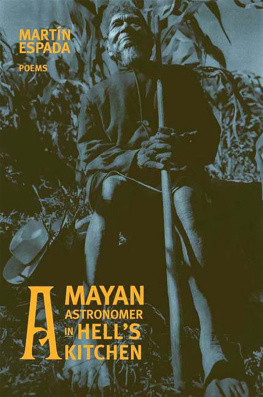
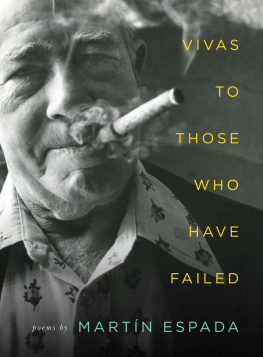
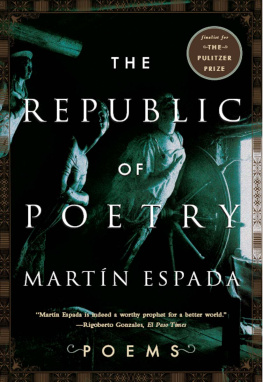
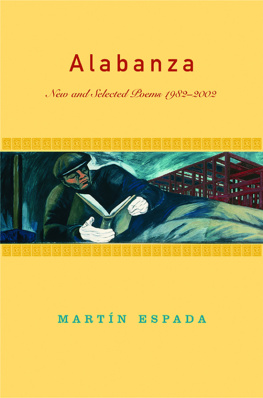
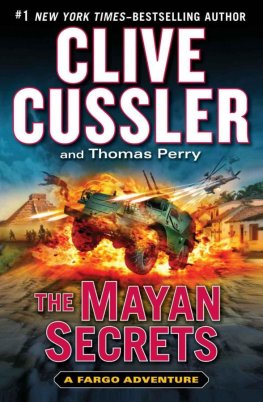

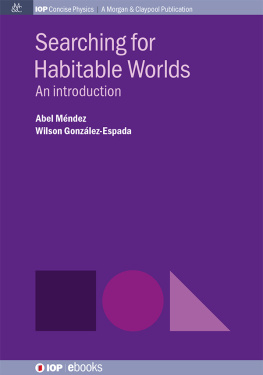
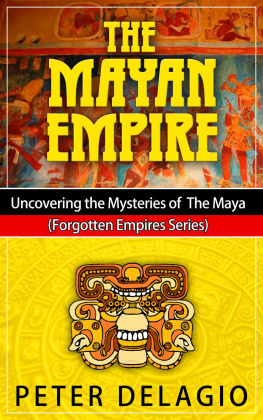

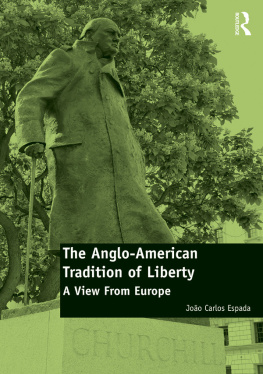
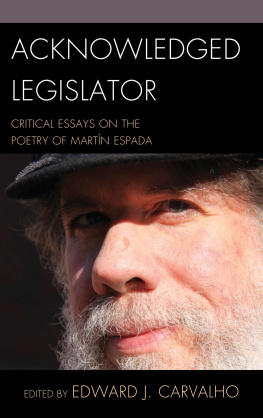
 OTHER BOOKS BY MARTN ESPADA Poetry Imagine the Angels of Bread City of Coughing and Dead Radiators Rebellion Is the Circle of a Lovers Hands Trumpets from the Islands of Their Eviction The Immigrant Iceboys Bolero Translation The Blood That Keeps Singing:
OTHER BOOKS BY MARTN ESPADA Poetry Imagine the Angels of Bread City of Coughing and Dead Radiators Rebellion Is the Circle of a Lovers Hands Trumpets from the Islands of Their Eviction The Immigrant Iceboys Bolero Translation The Blood That Keeps Singing:
 Adjusting type size may change line breaks. Landscape mode may help to preserve line breaks. Copyright 2000 by Martn Espada All rights reserved
Adjusting type size may change line breaks. Landscape mode may help to preserve line breaks. Copyright 2000 by Martn Espada All rights reserved